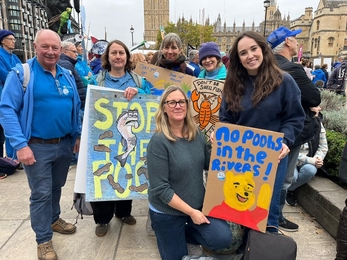An estimated 15,000 protesters flowed through the streets of London on the 3rd of November, representing organisations across the environmental sector. The fight for clean water in rivers, lakes and seas is an important one, with none of England’s rivers in good overall health.
Locally, we are lucky to have so many rare and precious chalk streams flowing through our county, including the Test, Itchen, Meon and Loddon. We are heavily reliant on these invaluable waterways for drinking water and the disposal of wastewater – contributing to over abstraction pressures and phosphate pollution which degrade water quality and biodiversity.
As the Government considers reforms to planning, amid efforts to boost housebuilding, it is critical that we seize this opportunity to deliver vital protections for our precious chalk streams. At the March and through the Save Our Chalk Streams Campaign, we have urged the Government to include essential protections for our chalk streams in planning – including status as irreplaceable habitats and the introduction of 50-100 metre no development buffer zones.
In September, 700 people supported our call on the Government to protect our chalk streams in the National Planning Policy Framework. As the Government prepares their response, events such as the March for Clean Water are vital to ensure that the new Government understands the threats to our waterways and how important it is to so many people that these threats are tackled.
Recent reports suggest that the new Government has abandoned the Chalk Stream Recovery Pack, promised under the previous government to provide clarity of its plan for chalk streams. The Government must urgently deliver this action pack, to provide a specific protection for our chalk streams, offer enhanced legal protections and commit to immediate investment in their conservation. We marched to keep pressure on so that our voice is heard, and our call to save our chalk streams cannot be ignored!



